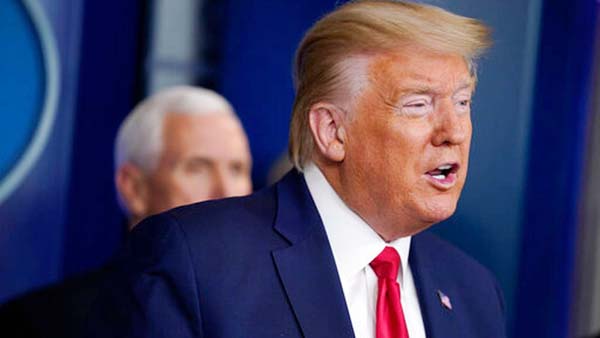
AP, Washington :
Describing himself as a “wartime president” fighting an invisible enemy, President Donald Trump invoked rarely used emergency powers to marshal critical medical supplies against the coronavirus pandemic. Trump also signed an aid package – which the Senate approved earlier Wednesday – that will guarantee sick leave to workers who fall ill.
Trump tapped his authority under the 70-year-old Defense Production Act to give the government more power to steer production by private companies and try to overcome shortages in masks, ventilators and other supplies.
Yet he seemed to minimize the urgency of the decision, later tweeting that he “only signed the Defense Production Act to combat the Chinese Virus should we need to invoke it in a worst case scenario in the future.”
“Hopefully there will be no need,” he added, “but we are all in this TOGETHER!” The mixed messaging came as Trump took a series of other extraordinary steps to steady the nation, its day-to-day life suddenly and fundamentally altered. The Canada-U.S. border, the world’s longest, was effectively closed, save for commerce and essential travel, while the administration pushed its plan to send relief checks to millions of Americans.
Trump said he will expand the nation’s diagnostic testing capacity and deploy a Navy hospital ship to New York City, which is rapidly becoming an epicenter of the pandemic, and another such ship to the West Coast. And the Housing and Urban Development Department will suspend foreclosures and evictions through April to help the growing number of Americans who face losing jobs and missing rent and mortgage payments.
But as Trump laid out efforts to help the economy, markets plummeted. Gone were nearly all the gains that the Dow Jones Industrial Average had made since Trump took office.
The administration announcements came on a fast-moving day of developments across the capital, its empty streets standing in contrast to the whirlwind of activity inside the grand spaces of the White House and the Capitol.
The Senate overwhelmingly passed a second coronavirus response bill, which Trump signed Wednesday night. The vote was a lopsided 90-8 despite worries by many Republicans about a temporary new employer mandate to provide sick leave to workers who get COVID-19. The measure is also aimed at making tests for the virus free.
Meanwhile the administration pushed forward its broad economic rescue plan, which proposes $500 billion in checks to millions of Americans, with the first checks to come April 6 if Congress approves.
The White House urged hospitals to cancel all elective surgeries to reduce the risk of being overwhelmed by cases. The president was pressed on why a number of celebrities, like professional basketball players, seemed to have easier access to diagnostic tests than ordinary citizens. “Perhaps that’s the story of life,” Trump said. “I’ve heard that happens on occasion.”
Trump dismissed a suggestion from his own treasury secretary, Steven Mnuchin, that the nation could face 20% unemployment at least in the short term. That’s an “absolute total worst case scenario,” Trump said. “We’re no way near it.”
The government has told Americans to avoid groups of more than 10 people and the elderly to stay home while a pointed reminder was given to millennials to follow the guidelines and avoid social gatherings. Trump likened the effort to the measures taken during World War II and said it would require national “sacrifice.”
“It’s a war,” he said. “I view it as a, in a sense, a wartime president. It’s a very tough situation.”
No longer able to run for reelection on a healthy economy, he was taking on the mantle of a wartime leader after played down the severity of the crisis for weeks.
The president also employed more nativist, us-vs-them rhetoric at the briefing, continuing his recent habit of referring to the coronavirus as the “Chinese virus,” which has been sharply criticized as racist. “It’s not racist at all,” Trump said. “It comes from China, that’s all.”
He was asked about a report that a White House aide had referred to the virus as the “Kung flu” when talking to an Asian-American reporter and Trump did not signal disapproval of the offensive term.
Trump later met nursing leaders and expressed “gratitude for those on the front lines in our war against the global pandemic” as he held out hope that the pandemic would be over soon.
“It’s been something, but we’re winning and we will win,” he said. “It’s a question of when and I think it’s going to go quickly. We hope it’s going to go quickly.”
A limited number of people gathered around a large table, their chairs spread apart in a display of social distancing.
The Defense Production Act gives the president broad authority to shape the domestic industrial base so that it is capable of providing essential materials and goods needed in a national security crisis. The law allows the president to require businesses and corporations to give priority to and accept contracts for required materials and services.
The executive order issued by Trump gives Health and Human Services Secretary Alex Azar the authority to determine “the proper nationwide priorities and allocation of all health and medical resources, including controlling the distribution of such materials … in the civilian market, for responding to the spread of COVID-19 within the United States.” It also applies to certain health services.
Trump also said he would soon invoke a rarely used federal statute that would enable the U.S. to tighten controls along the southwest border because of the new coronavirus, based on a recommendation of the U.S. surgeon general.

